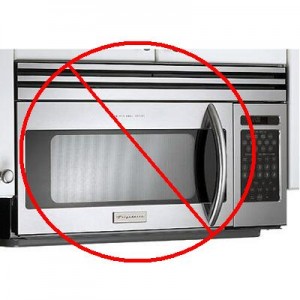
Microwaving Zaps the Nutrients Right Out of Your Food
by Dr. Joseph Mercola, www.mercola.com
There has been surprisingly little research on how microwaves affect organic molecules, or how the human body responds to consuming microwaved food.
Wouldn’t you expect that a product that sits in more than 90 percent of kitchens, as well as practically every break room in the country, would have been thoroughly investigated for safety?
The handful of studies that have been done generally agree, for the most part, that microwaving food damages its nutritional value. Your microwave turns your beautiful, organic veggies, for which you’ve paid such a premium in money or labor, into “dead” food that can cause disease!
Heating food, in and of itself, can result in some nutrient loss, but using microwaves to heat food introduces the additional problem of the “microwave effect,” a phenomenon that will be discussed in detail later.
The majority of studies on microwaves and nutrition were conducted prior to 2000, I suspect because the focus of radiation research of late has shifted toward a more ominous threat: environmental radiation from electromagnetic devices, such as cell phones and computers, which has mushroomed into a gigantic cloud of electrosmog worldwide over the past decade.
Nevertheless, some excellent scientific data has been gathered regarding the detrimental effects of microwaves on the nutrients in your food:
- A study published in the November 2003 issue of The Journal of the Science of Food and Agriculture[5] found that broccoli “zapped” in the microwave with a little water lost up to 97 percent of its beneficial antioxidants. By comparison, steamed broccoli lost 11 percent or fewer of its antioxidants. There were also reductions in phenolic compounds and glucosinolates, but mineral levels remained intact.
- A 1999 Scandinavian study of the cooking of asparagus spears found that microwaving caused a reduction in vitamin C[6] .
- In a study of garlic, as little as 60 seconds of microwave heating was enough to inactivate its allinase, garlic’s principle active ingredient against cancer[7] .
- A Japanese study by Watanabe showed that just 6 minutes of microwave heating turned 30-40 percent of the B12 in milk into an inert (dead) form[8] . This study has been cited by Dr. Andrew Weil as evidence supporting his concerns about the effects of microwaving. Dr. Weil wrote:
- “There may be dangers associated with microwaving food… there is a question as to whether microwaving alters protein chemistry in ways that might be harmful.”
- A recent Australian study[9] showed that microwaves cause a higher degree of “protein unfolding” than conventional heating.
- Microwaving can destroy the essential disease-fighting agents in breast milk that offer protection for your baby. In 1992, Quan found that microwaved breast milk lost lysozyme activity, antibodies, and fostered the growth of more potentially pathogenic bacteria[10] .
Quan stated that more damage was done to the milk by microwaving than by other methods of heating, concluding: “Microwaving appears to be contraindicated at high-temperatures, and questions regarding its safety exist even at low temperatures.”
- Another study about breast milk/infant formula by Lee in 1989[11] found vitamin content becomes depleted by microwaving, and certain amino acids are converted into other substances that are biologically inactive. Some altered amino acids are poisons to the nervous system and kidneys. (Numerous authors mention this study, yet I was unable to find the original article/study, so I cannot personally validate.)
Although many of the above studies are not new, there is certainly ample evidence that microwaving is NOT good for your food.
Real Food Whole Health TIP:
Instead of using the microwave, use the oven, the stovetop, a toaster over, toaster or crockpot. You can even take a hot plate and stainless steel (or other safe material) saucepan to the office to heat your lunch in.


great article Amy! Everybody in America needs to know this!
great article Amy! Everybody in America needs to know this!